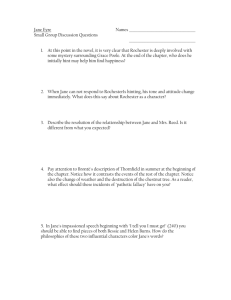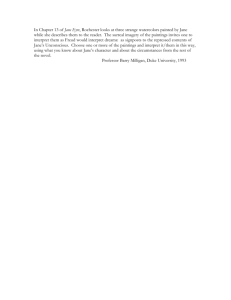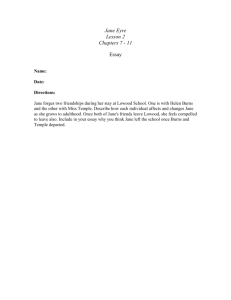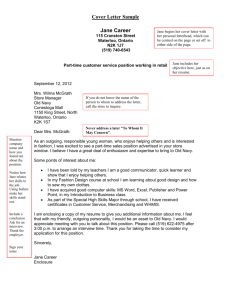here - Academy of Teaching Excellence
advertisement
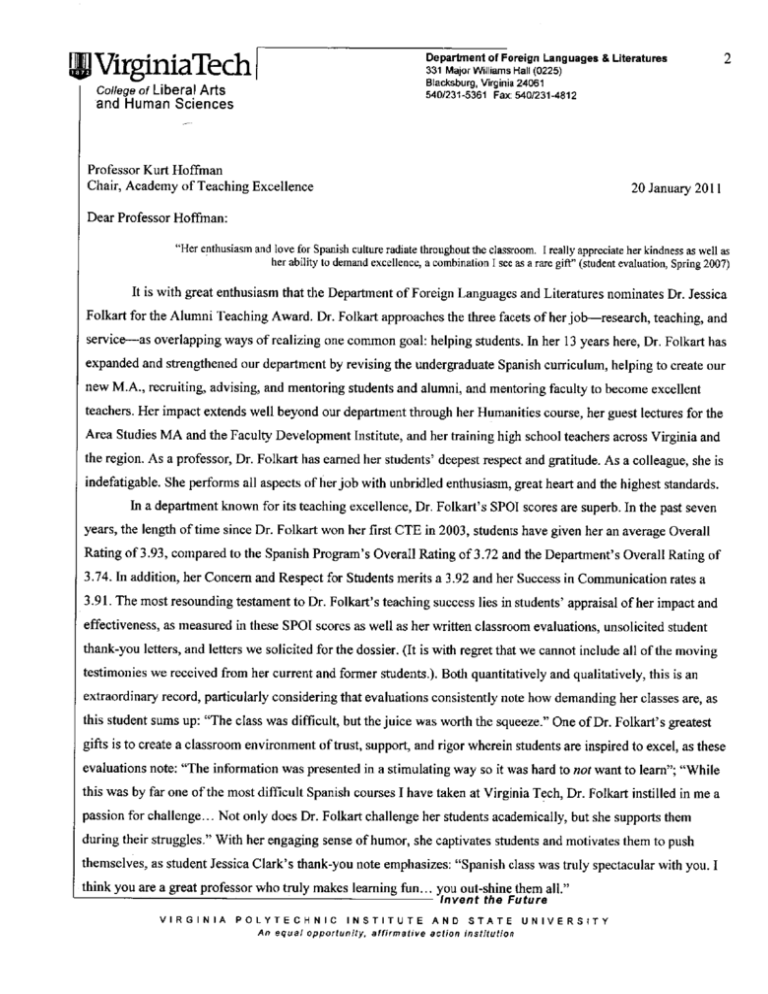
Chair, Department of Physics College of Science Blacksburg, Virginia 24061-0435 (540) 231-7472 FAX:(540) 231-7511 E-mail: physics.chair@vt.edu Dr. Kurt Hoffman, Chair, 2010-2011 Alumni Teaching Award Selection Committee 123 Williams Hall Psychology (0141) January 26, 2011 Dear Colleagues: On behalf of the Department of Physics, it is my sincere pleasure to nominate Prof. Leo Piilonen for the Alumni Teaching Award. Leo’s manifold contributions to our teaching and learning mission, as a superb teacher, advocate of instructional technology, and effective leader of curriculum-related governance, will impact his students and Virginia Tech for decades to come. Let me first highlight a selection of Leo’s contributions to curricular affairs. For many years, he has been a very effective and pro-active chair of the Undergraduate Committee in the Physics Department. In this role, he oversaw the development and approval of several new courses as well as the creation of the Physics ViEWS policy. The courses adopted during his tenure include critical components of our undergraduate program such as Mathematical Methods in Physics and Modern Physics as well as attractive electives, e.g., Nanotechnology and Introduction to General Relativity (both cross listed at the 4000 and 5000 level). The success of our undergraduate program rests on such cornerstones: courses building a solid foundation, and courses introducing cutting-edge science. Leo’s second major achievement lies in his early adoption and creative use of technology for teaching and learning. He was one of the first faculty members in the department to recognize the value of the web for the delivery of course-related information to students and faculty. To make his large introductory classes more interactive, he spearheaded the use of audience-response systems which are now widely accepted by most instructors in those settings. And finally, he led the department towards adopting a fully electronic, online system for assigning and grading problem sets. After overcoming the inevitable teething problems (managed by Leo, with great patience), these systems have become very powerful and flexible, offering fantastic learning experiences to over 3,000 students each year. Let me now turn to Leo’s performance as a teacher and mentor. Equally effective in every setting, he has frequently been asked to take on some of our most challenging assignments: the calculus-based Foundations of Physics (PHYS 2305 and 2306) for physics and engineering freshmen, and Intermediate Electricity and Magnetism (PHYS 3405 and 3406), an in-major course for our juniors which requires a Invent the Future V I R G I N I A P O L Y T E C H N I C I N S T I T U T E A N D S T A T E U N I V E R S I T Y An equal opportunity, affirmative action institution 2 3 much higher level of mathematical sophistication than anything the students have seen before. In the attached letters (which are a small selection from the enthusiastic deluge that we received), Leo is characterized as an exceptional, dedicated, and challenging teacher who is immensely generous with his time and very creative in making complex topics accessible. The following quotes (from letters not included with this dossier) illustrate his enthusiasm, competence, care, and patience: “My experience as a student of Professor Piilonen’s has given me a great teaching example to follow when performing my current work as a physics tutor for high school students. Being on the teaching side of the student-teacher relationship has only increased my respect for his teaching ability. His thoroughness in explaining material and more amazingly, the long hours he spends with his students really do make a difference.” (Richard Bailey, BS Physics 2009). “He was always incredibly enthusiastic and easily managed to keep the interest of the entire lecture hall of 200 or more students every day. Prof. P was also a fantastic teacher one-on-one and in small groups during office hours, recitation sections, and the freshman seminar course that physics majors are required to take at Virginia Tech.” (Anna Belak, BS Physics 2008). “As an undergraduate student and also as a graduate student, I would go to Prof. Piilonen for help from time to time when I had difficulty understanding a topic from another physics class. His devotion to teaching excellence is unmatched and deserves recognition.” (Matt Joyce, MS Physics 2008) “Combining his approachable demeanor and his mastery of any subject that I could possibly ask him about, I can recall countless occasions in which I came to Dr. Piilonen not during his office hours for help in classes that he didn’t teach. What’s more remarkable is that I was never once turned away. That kind of patience and dedication to education are qualities that I can only hope to one day achieve as a teacher. In fact, when I first learned of my teaching assignment, Dr. Piilonen was the first of my previous teachers that I approached to seek advice.” (Julian McMorrow, BS Physics 2010) “This ability to explain the material well was complimented [sic] by his saint-like patience. Due to the nature of the topics covered, some students were required to know a level of mathematics that they had not previously learned from outside courses. Dr. Piilonen soon recognized this fact and was more than willing to offer additional help after class or during his office hours. In addition, the manner in which he answered questions denoted his level of patience. Regardless of how fundamental a question was, he never dismissed a student's inquiry as trivial or trite, and he never presented frustration at student's struggle to grasp basic concepts.” (Travis Merritt, BS Physics 2005). Julian McMorrow summarizes the case: “…I wholeheartedly offer my support for Dr. Piilonen’s nomination for the College of Science Teaching Excellence Award. “Excellence” is the only word that could describe him as an educator, and I know of no professor at Virginia Tech more deserving than Dr. Piilonen.”. I hope you will agree and urge you to consider Leo for the Alumni Teaching award. Dr. Beate Schmittmann Professor and Chair Department of Physics V I R G I N I A P O L Y T E C H N I C I N S T I T U T E A N D S T A T E U N I V E R S I T Y An equal opportunity, affirmative action institution English Department Liberal Arts and Human Sciences College of 323 Shanks Hall (0112) Blacksburg, Virginia 24061 540/231-6501 Fax: 540/231-5692 www.english.vt.edu 2 February 2012 To the Alumni Teaching Excellence Award Selection Committee: Jane Wemhoener consistently receives among the highest teaching evaluation scores and the most enthusiastic student comments of faculty members in the Department of English. In addition to recognizing her outstanding work in the classroom, the Department of English nominates her for an Alumni Teaching Excellence Award on the basis of her work in international education, service learning, and student advising. As her teaching philosophy makes clear, teaching is not just about what happens in a classroom, but also about how that classroom connects with the world beyond. Accordingly, to the great benefit of our department and of her students, in particular, opportunities in service learning and international themes abound in her classrooms. Jane’s teaching crosses several options within the English major; she teaches courses in children’s literature, women’s literature, and world literature, and she has an extensive background in business writing (which she taught almost exclusively in her early years in the department). Her expertise in international programming and world literature has resulted in the development of two new courses with international content for the Department of English, one with a focus on applying study abroad learning to students’ undergraduate research and writing (for all majors), and a second which focuses on “The World’s Banned Books.” Her teaching and background in professional writing informs her Africa teaching project, a distance education program she has designed with Duke University and the Kilimanjaro Christian Medical College, and which engages Virginia Tech faculty in its delivery. As mentioned above, Jane’s primary teaching assignment in her early career in our department focused upon business writing, a service course that formerly fulfilled the university writing-intensive requirement, but now serves as an elective. Such courses are not usually ones to which students flock, as they often anticipate that they will be boring and carry a heavy workload. Students are surprised by their degree of engagement with the course and with the values they retain when the course is over. Jane typically received overall course scores of 3.9 or 4.0 for her Business Writing courses, significantly above the department average for other sections of Business Writing. One of the reasons for this is Jane’s integration of service learning projects into her syllabi. Students learn to write proposals, publicity materials, reports, correspondence, and other business documents by working with nonprofit organizations such as Local Colors (Roanoke), the VT-YMCA, Literacy Volunteers, and the Red Cross. Such projects require significant instructor co-ordination and involvement with student projects. Jane cannot simply send the students off to write and evaluate projects at the end of the term. Rather, she engages everyone involved throughout the semester by helping students understand the writing context and its constraints, as well as strategies for writing to help the organization achieve its goals. Students see the power of writing at work in the world, solving problems and accomplishing goals. Guidelines for good writing become meaningful in terms of these goals, Invent the Future V I R G I N I A P O L Y T E C H N I C I N S T I T U T E A N D S T A T E U N I V E R S I T Y An equal opportunity, affirmative action institution not just as dry rules. As Jane explains, “students write to a higher level when their words address a real need.” Clients appreciate Jane’s supervision — as well as the student results — and return to her semester after semester with projects for our students. This is teaching at its best: helping students connect learning to the world beyond the classroom and motivating them to use the tools that they are learning and to learn the tools thoroughly in order to use them well. The bonds she forges between the university and the community have created an essential ongoing collaborative association. In an unsolicited e-message from a Spring 2007 student (copied to me), Ryan Rohrer describes the value of the course to his internship with a government and business consulting firm. His internship assignments include co-ordinating trade shows, editing marketing literature, developing training and external sales presentations, layout of a company brochure, and writing for newsletters and websites. He writes: “Business Writing is the most useful class that I have ever taken in my 15+ years of formal education. While that is an extremely bold statement, I stand behind it and would recommend your class to anyone (and I already have).” In the past few years, Jane has significantly expanded her repertoire of courses. She now teaches courses in Women’s Literature, Children’s Literature, and World Literature; the student evaluations show that her teaching expertise and success extend to these very different subjects and varying venues, including a reading-intensive lecture section of 80 students. Jane’s evaluation scores in these courses are, remarkably, as high as those from her business writing courses. Although the class may be large, Jane shows an interest in each student as an individual, taking the time to know each one. In spite of its size, the class feels small to students because Jane takes the time to listen to them within and outside of class and to comment on their reading responses. Two examples drawn from the evaluations illustrate the point emphatically: • • “I feel like this course has opened my eyes about the problems women have faced and continue to face. As an engineering major I do not often have this kind of experience.” “I have learned an exponential amount about women’s literature. I have developed an interest in the material that I never would have had without this class. We covered a very large number of literary works and we linked them all effortlessly. Professor Wemhoener is my favorite professor at Tech so far.” Jane’s interest in her students and her generosity in interacting with them is one of the reasons why the Department of English’s faculty-led study abroad program has been such a success. With significant experience in international education, Jane has guided the preparation of students and faculty, compliance with university procedures and policies, budget management, and administration of a scholarship with a knowing hand. Under her leadership, we reestablished the program in the summer of 2008 and have now taken four groups to England for wonderful experiences that she arranges including theatre, tours, and interactions with British authors, as well as for-credit courses. They will be making their fifth trip this year just prior to the Olympics. The program is multidisciplinary, including components in art, photography, and architecture, as well as literature. In 2009, she also served as an instructor, as well as organizer. Enacting her philosophy that what happens in the classroom is intimately related to what happens beyond, Jane makes sure that the summer experience continues beyond the term as the group V I R G I N I A P O L Y T E C H N I C I N S T I T U T E A N D S T A T E U N I V E R S I T Y An equal opportunity, affirmative action institution reunites, often in Jane’s home, with British food prepared by Jane, to reflect upon the experience and share their writing and memories. Students have found this study-abroad experiences transforming. Her interest in international education has spanned her entire career. At Virginia Tech, beyond the department, she has chaired the university’s China Studies Task Force and written a Fulbright grant proposal with a cross-college faculty team with the intent of making China Studies an integral part of the Virginia Tech Curriculum. She also advocates for international education on a statewide level in her role as Executive Director of the Virginia Council for International Education, a non-profit group with public and private educational institution members. She convenes the group each fall to plan international education strategy for the state. She was invited by SCHEV in December 2009 to serve as a panelist on a program called “Building Collaborative International Initiatives Among VA Colleges/Universities.” Jane is excellent in the classroom, but her definition of teaching is not bound by classroom walls. She sends students beyond the classroom for projects, organizes study abroad, and develops international programs. She also welcomes students to her office, and many seek her out for academic advising and letters of recommendation and general mentoring. Students are exuberant in their descriptions of their experiences with Jane, as the recommendations included in this dossier will reveal. Her colleagues are equally exuberant, as the peer reviews and recommendations will affirm. Jane has won several awards for her outreach and service learning, but that work all begins with her classes. She is a gifted, generous, and highly effective teacher, whatever assignment the department gives to her. She has made a difference in the lives of numerous students from across the university and is one of the faculty members whom students remember when they graduate. She would be a most deserving recipient of an Alumni Teaching Excellence Award. Sincerely, Joseph F. Eska Professor and Chair V I R G I N I A P O L Y T E C H N I C I N S T I T U T E A N D S T A T E U N I V E R S I T Y An equal opportunity, affirmative action institution


